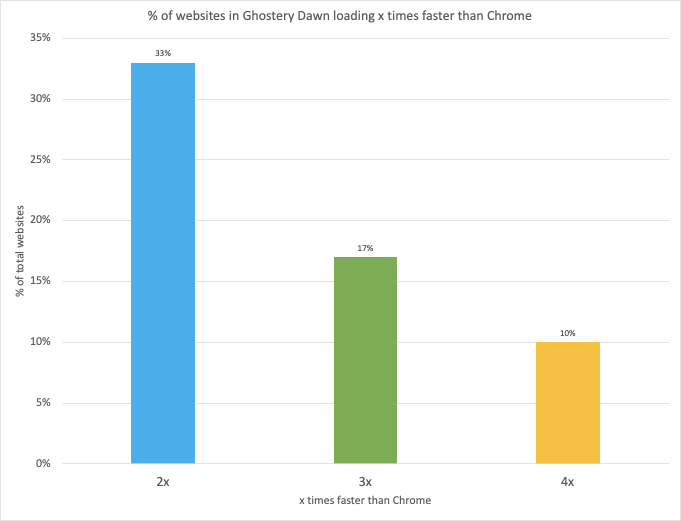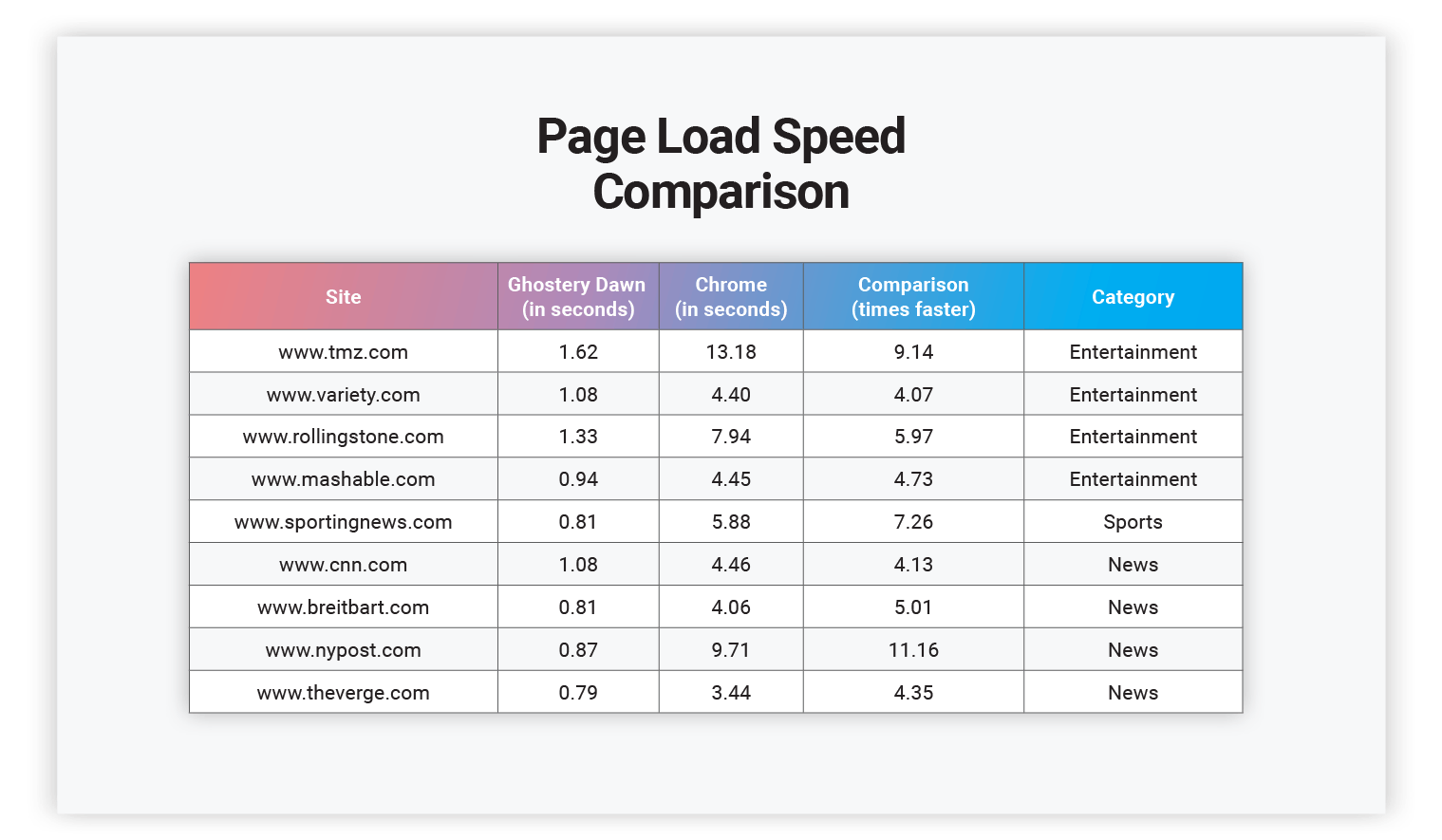Product
Ghostery Private Browser: Our New Browser is Lightning-Fast

Note: The Ghostery Private Browser has been retired, but you can still enjoy privacy-first features with the Ghostery Tracker & Ad Blocker Extension.
What happens when we put two web browsers in the ring to duke it out?
We put in our new up-and-comer Ghostery Private Browser against a well-known champ, Google Chrome, and we’re proud to say that our brand-new, lightning-fast browser came out on top!
Our priorities when we built Ghostery Private Browser were split evenly among privacy, security, and speed. But we’re not going to lie — speed alone is a pretty big deal and some of the numbers we found are really exciting!
Ghostery Private Browser: A Faster, Safer Web Browser

Let’s check out this chart to understand what makes Ghostery Private Browser faster. In an internal test(1), we found that nearly one-third of the 92 websites we tested loaded at least 2x times faster on Ghostery Private Browser than on Chrome.
Here’s a better breakdown of our analysis:
- 33% of websites tested ran 2x faster on Ghostery Private Browser
- 17% of websites tested ran 3x faster on Ghostery Private Browser
- 10% of websites tested ran 4x faster on Ghostery Private Browser
And here are the results broken down by category:
- In the News Category, Ghostery Private Browser is 2.13x faster
- In the Entertainment category, Ghostery Private Browser is 2.63x faster
- In the Sports category, Ghostery Private Browser is 1.94x faster
- In the E-Commerce category, Ghostery Private Browser is 1.54x faster
Ghostery Private Browser saves you days each year
Since Ghostery Private Browser loads web pages up to 3x faster than Chrome, we wanted to see what would happen when we ran several speed test comparisons on average Chrome page load times.
The good news? Using Ghostery Private Browser may save you a few days’ worth of time per year! Here’s how we ran speed test comparisons on average Chrome page load times:
First, we determined the average page load speed for a web page on desktop is 10.3 seconds based on the 2019 data from Backlinko, which analyzed the speed of 5.2 million web pages.
Next, considering browser market share(2) and how many times faster each browser is than Chrome(3), we determined that Chrome has an average page load speed of 11.20 seconds.
Since Ghostery Private Browser is 2.08x faster than Chrome, the average page load speed in our browser is 5.4 seconds. This is a savings of 5.8 seconds per page load. 5.8 seconds x 140 sites per day(4) x 365 days balances out to be 3.44 days per year that Ghostery Private Browser saves you relative to Chrome.
That’s 3.44 days per year that companies are not making money from using your data!
How is Ghostery Private Browser so much faster?
For one, we built on the open source Firefox browser which itself is 1.78x faster than Chrome. We took this template and rebuilt it for the Ghostery Private Browser experience. Our test results show that Ghostery Private Browser is 1.34x faster than Firefox! Click here to take a look under the hood. Additionally, by blocking ads and trackers, we’ve minimized the amount of clutter that typically loads with a web page.
Page Loads: The Worst Offenders
We also wanted to take down the worst offenders. You know, those routinely “bad” sites with tons of tracking scripts causing the pages to load slowly, not to mention the tons of data they are collecting.
Yep, we’re looking at you TMZ. They not only come in first as the most bloated but they also are the slowest in our comparison.

In this chart, we’re comparing page load speeds by seconds. The comparison is how much faster Ghostery Private Browser is against Google Chrome. Keep in mind that by blocking ads and trackers, we’ve minimized the amount of clutter that typically loads with a web page. Let’s say you want to log onto Variety.com. Ghostery Private Browser loaded the page in 1.08 seconds and Google Chrome loaded the same page in 4.40 seconds. So, in that comparison, Ghostery Private Browser is 4.07 times faster than Google Chrome!
Before it felt like, as consumers, we were backed into the corner and on the ropes. By using Ghostery Private Browser, we’re able to bob and weave our way out and wind up for the knockout. Here’s a link to our FAQs page if you have any questions about the new kid on the block.

